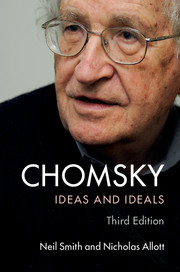Book contents
- Frontmatter
- Dedication
- Contents
- Preface to the third edition
- Preface to the second edition
- Preface to the first edition
- Introduction
- 1 The mirror of the mind
- 2 The linguistic foundation
- 3 Language and psychology
- 4 Philosophical realism: commitments and controversies
- 5 Language and freedom
- Conclusion
- Envoi
- Notes
- Bibliography
- Index
Conclusion
Published online by Cambridge University Press: 18 December 2015
- Frontmatter
- Dedication
- Contents
- Preface to the third edition
- Preface to the second edition
- Preface to the first edition
- Introduction
- 1 The mirror of the mind
- 2 The linguistic foundation
- 3 Language and psychology
- 4 Philosophical realism: commitments and controversies
- 5 Language and freedom
- Conclusion
- Envoi
- Notes
- Bibliography
- Index
Summary
No-one has ever said it better than Gramsci… “you should have pessimism of the intellect and optimism of the will.”
(Chomsky, 1992b: 354)By any criterion Chomsky's achievement is vast. As the guiding spirit of the cognitive revolution, he has been instrumental in changing our view not just of language but of human nature. He has tamed the infinite complexity of language, and in doing so has given us a new appreciation of what we owe to the hand of nature and what we owe to the environment. He has done it through insight, through fanatical hard work and by devoting his efforts to problems rather than mysteries. The problems have come in different forms: some, like I-language, are amenable – when suitably dissected – to theoretical discussion; others, like politics, require not so much a theory as the dispassionate application of common sense in the scrutiny and presentation of the facts. Solving any of them requires dedication.
By contrast, there are mysteries where neither of these techniques appears to work. The creativity of genius, the everyday problem of free will, even the apparently banal Cartesian problem of what causes our particular use of language on given occasions, all seem still to lie beyond the reach of our intellect. Chomsky has had little to say on these areas, since he thinks agnosticism is the only rational position to adopt, but even here he has clarified the issues by drawing relevant distinctions and by proposing a framework for the debate.
In some cases he has also raised the prospect of transferring particular phenomena from the status of “mysteries” to “problems.” The most obvious such area is the evolution of language that, because of the difficulty of getting relevant evidence, had long seemed inscrutable. For many years Chomsky suggested that we could say little of interest beyond the truism that language is the result of evolution, but his recent work with ethologists and evolutionary biologists, building on a massive cross-disciplinary base, has begun to shed light here too. A related example comes in his latest preoccupation with the question of how “perfect” language is as a solution to the problem of linking sound and meaning. A few years ago such questions could not even be posed and it is not yet clear whether they can be convincingly answered.
- Type
- Chapter
- Information
- ChomskyIdeas and Ideals, pp. 333 - 334Publisher: Cambridge University PressPrint publication year: 2016

